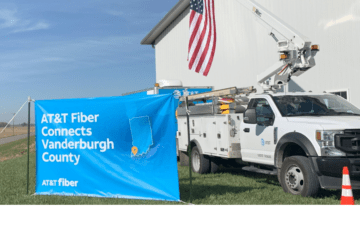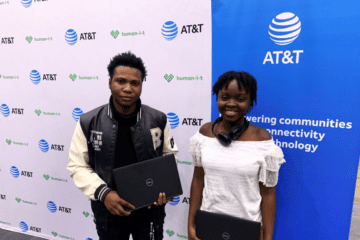Juan Constantino is keenly aware of how crucial closing the digital divide is for the Latino, Hispanic, and immigrant communities in Northern Indiana. His South Bend-based nonprofit organization, La Casa, offers a “digital assistance program” aimed at empowering and equipping people with technology.
Recently, Juan and La Casa, worked with AT&T and Human I-T to distribute 200 free refurbished laptops to people served by his organization. And he knew the perfect time to do it – during their annual back-to-school event that would also provide free uniforms, school supplies, meals, and other resources at a critical time of year for local families.
In this brief Q&A, you can learn more about Juan, who’s focused on offering opportunities for families to succeed in today’s society.
Q: What do you love most about the overall mission of your organization?
A: With a Latino population that is growing in our community, La Casa de Amistad ultimately leads to empowerment. It’s a mission of empowerment and impact that provides welcome. At the end of the day, we’re giving people opportunity – access to things they need when they need it.
Q: In 2024, how important is internet connectivity to the people you serve?
A: It’s more important than ever to have access to broadband or spaces that have broadband available. We’re living in a moment of continuous development of technology, through things like AI, and because of that, it’s hard not to have basic access to technology – it’s making the digital divide even wider for some individuals.
Q: When you encounter people who are not connected to the internet, what is the reason why?
A: When clients come to La Casa and have issues with digital access, we primarily hear that they don’t speak English, let alone know how to write it – there’s a language barrier. For some, they don’t have a computer or internet or home. Or, it’s both that they don’t speak the language, and don’t have the access.
The way our community is connected through the web is primarily through cell phones – but even if they have a laptop at home, they may lack the digital literacy to log on, apply for a job, or apply for Medicaid or Medicare. It makes it impossible to get digital things done. It’s quite a challenge for folks.
Q: What was the reaction to the laptop giveaway with AT&T?
A: When we made the announcement about the computers, we could not answer the phones quick enough. Our social posts nearly went viral. We were grateful to be asked to be the “funnel” to onramp the families for signups.
We sought feedback from a number of partners, including the City of South Bend and South Bend schools, to get their input on the best ways to distribute them. We tried to figure out with them which students had the biggest technology gap. We all landed on criteria that included the recipients being middle school or high school students; that only one computer could be given to a household; and, we set specific income limits. In the end, the laptops were given out to 200 different households, representing 39 different schools in our area.
After the laptops were given away during our back-to-school event, I had a conversation with a recipient who was a single mom with two daughters, one an 8th grader and the other a freshman. The mom told me that she knew the girls’ homework was getting more difficult for both of them. Mom was juggling getting them access to computers and connectivity at the library. She shared how much of a difference their computer has made in how they now manage their everyday lives. Families to this day tell us how wonderful it is to have the new technology at their home.
One final thought: I think it’s important to share that thanks to AT&T’s contribution, we’ve had other partners step up and now donate to La Casa. You’ve motivated others to make that impact.





